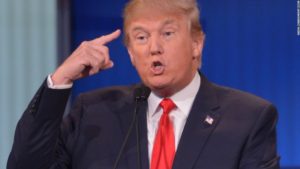 In an article in the New York Times on June 9, 2017, reporter Charlie Savage leads us on a path to help us understand just what — and what is not — a “leak,” and was James Comey’s disclosure of written memoranda documenting his interactions with the president a leak? Or was it something else? A plant? Whistle blowing? You decide.
In an article in the New York Times on June 9, 2017, reporter Charlie Savage leads us on a path to help us understand just what — and what is not — a “leak,” and was James Comey’s disclosure of written memoranda documenting his interactions with the president a leak? Or was it something else? A plant? Whistle blowing? You decide.
Dana Gold, the director of education for the nonprofit Government Accountability Project, argued in an essay in Slate on Friday that Mr. Comey merited being described as a “whistle-blower” rather than as a “leaker,” given that he was bringing to light information about potential obstruction of justice by the president.
The following are excerpts from that article. For the entire article, continue reading here.
What is a leak?
The word “leak” has no official legal definition. But the term usually refers to the act of providing confidential information to the public in a surreptitious way and without official authorization.
That is a neutral description, but Mr. Trump on Friday used the term in a way that was clearly intended to carry pejorative connotations: “He’s a leaker,” Mr. Trump said of Mr. Comey at a news conference.
What is not a leak?
Sometimes former officials, without authorization, publish memoirs recounting high-level internal conversations, or officials blurt out secret information at a congressional hearing. In those cases, the disclosure is not clandestine and therefore not a leak.
Other times, news reporters publish previously confidential information and attribute it to officials who spoke anonymously, but behind the scenes those officials had obtained permission to talk. Such a disclosure could be described as a “plant” because there was an official policy decision to put out that information.
Is leaking the same thing as whistle-blowing?
Whistle-blowing is a subset of leaks about waste, fraud, illegality, abuse of power or some other form of government or corporate wrongdoing. Defenders and critics of leakers often spar over whether any particular disclosure meets that higher moral standard.
Are leaks illegal?
Most are not, but some are. Federal law criminalizes the leaking of certain types of information. The Espionage Act makes it a felony to disclose, to someone not authorized to receive it, information related to the national defense that could be used to harm the United States or aid a foreign adversary. A small handful of specific types of information — like nuclear secrets, the identities of covert agents and techniques for surveillance of intelligence communications — are separately protected by law. For most of American history, the government did not punish leakers through criminal action, but in the 21st century, leak prosecutions have become more common.
Are officials legally bound not to disclose their conversations with the president?
No. The president’s lawyers are said to be planning to file a complaint with the Justice Department’s inspector general next week arguing that Mr. Comey had improperly disclosed what they deemed privileged communications. But Renato Mariotti, a former federal prosecutor, noted that this destination for their complaint “tells me they couldn’t come up with a legal basis to file a lawsuit.”
Executive privilege is a constitutional doctrine that presidents may assert to block Congress from obtaining information about their confidential communications with other executive branch officials related to their constitutional duties. Separately, under attorney-client privilege, current or former lawyers for a president have an ethical duty to keep their confidential communications secret, and they could face a bar complaint for disclosing them. But neither of those principles creates a legal duty for other types of former officials to stay silent about their recollections of their talks with the president.
Amid all the noise, it is nice to have some clarifications. Thank you, Mr. Savage, for your insight.
In case you were wondering . . .
